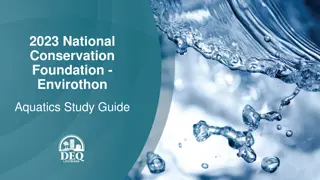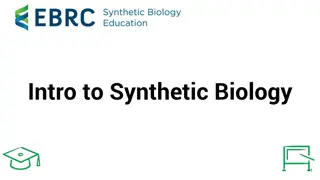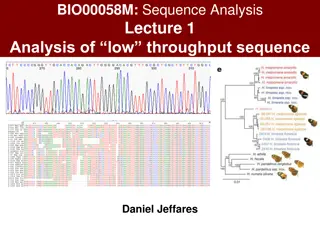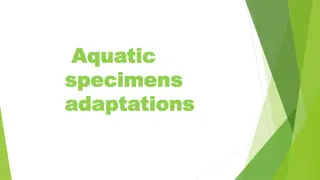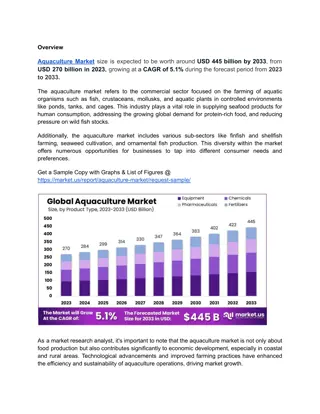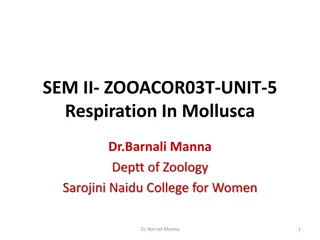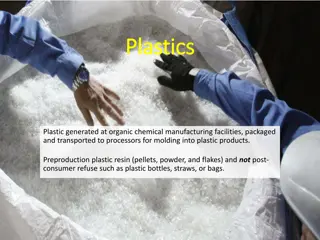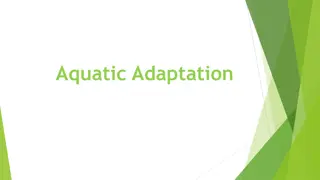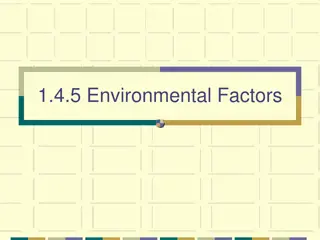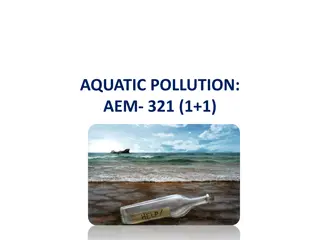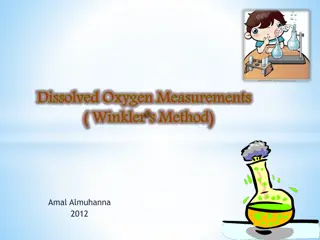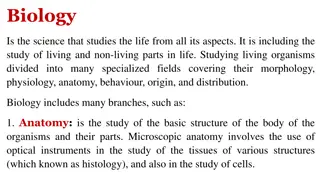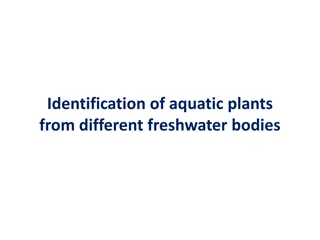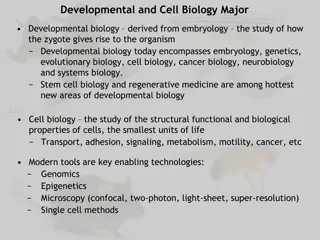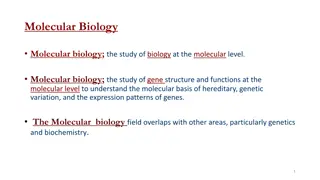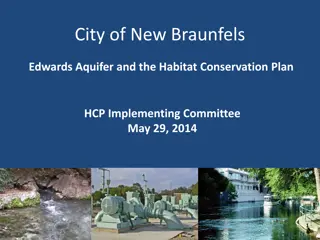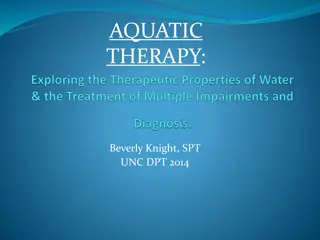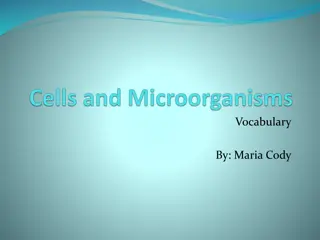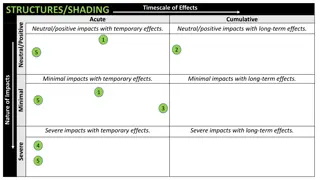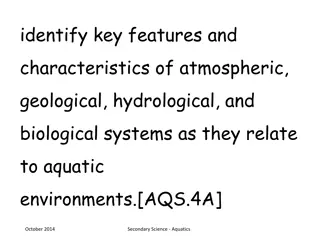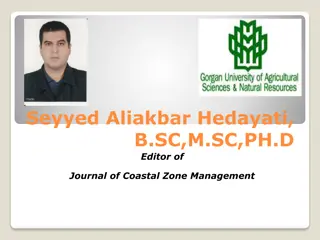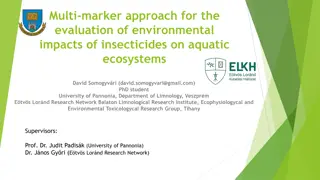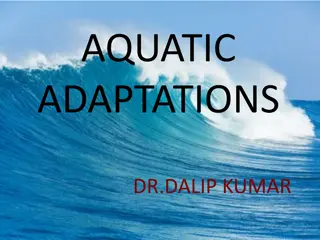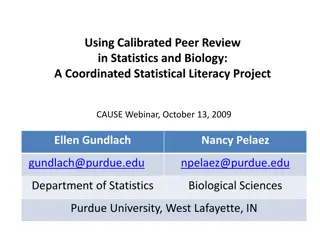8th Singapore Junior Biology Olympiad 2023 Pre-registration Briefing Information
The 8th Singapore Junior Biology Olympiad (SJBO) 2023 aims to promote the advancement of Biology among Secondary School students from Sec 2-4 levels in Singapore. This prestigious competition encourages students to excel in Biology by focusing on practical skills and critical thinking. The structure
2 views • 34 slides
Exploring The Best Swim School To Start Your Aquatic Journey
Are you trying to find the Best Swim School to start your aquatic career? Ace Dolphin is the only place to look. Ace Dolphin, which is well-known for its dedication to quality, provides amazing swimming programs for people of all ages and skill levels. Let\u2019s explore why Ace Dolphin is an ideal
1 views • 3 slides
Dissolved Oxygen Measurements and Factors Affecting Oxygen Levels
Understanding the importance of dissolved oxygen in water is crucial for the survival of aquatic plants and animals. Factors such as chemical reactions, temperature, pressure, and light penetration influence oxygen levels. The Winkler method is commonly used for dissolved oxygen measurements. This m
4 views • 11 slides
Understanding Total Solids and Total Suspended Solids in Water
Learn about total solids and total suspended solids in water, including their definitions, implications on water quality and aquatic life, and factors affecting their levels. Total solids refer to matter suspended or dissolved in water, while total suspended solids are small solid particles that can
7 views • 12 slides
2023 National Conservation Foundation - Envirothon
Explore the intricate dynamics of aquatic ecosystems and wetlands conservation through this comprehensive study guide. Discover the importance of watersheds, the hydrologic cycle, aquatic food webs, energy flow at trophic levels, and common macroinvertebrates in Louisiana. Learn about different wetl
3 views • 27 slides
Achieve Greatness Conquer the IB Biology Diploma Programme Exam
Unlock your potential and excel in the IB Biology Diploma Programme Exam with our comprehensive study resources. Gain access to practice tests, study guides, and expert guidance to elevate your performance. Start your journey towards academic success today!\nClick Here to Get IB-Biology Dumps With 1
1 views • 6 slides
Introduction to Synthetic Biology: Understanding the Core Concepts and Applications
In this introductory lecture on synthetic biology, you will explore the fundamental principles of engineering biology, including the design and construction of new biological entities. The focus is on leveraging molecular, cell, and systems biology advancements to create biological systems that can
0 views • 89 slides
Transformative Power of Sequencing in Molecular Biology
The falling costs of sequencing have revolutionized various fields like genetics, genomics, cell biology, microbiology, and evolutionary biology. Sequencing data has enabled us to understand genomes, revolutionize cell biology techniques, conduct comparative genomics, population genomics, and metage
1 views • 31 slides
Adaptations of Aquatic Specimens, with a Focus on Sea Snakes
Aquatic specimens, particularly sea snakes of the subfamily Hydrophiinae, exhibit fascinating adaptations for their fully aquatic lifestyle. These marine snakes are uniquely adapted for life in the sea, with specialized features such as paddle-like tails, compressed bodies, and the ability to respir
0 views • 16 slides
Sustainable Aquaculture Products Attract Environmentally Conscious Consumers
Aquaculture Market By Product Types(Equipment, Chemicals, Pharmaceuticals, Fertilizers), By Culture(Fresh Water, Brackish Water, Marine Water), By Species( Aquatic Plants, Aquatic Animals), By End-User(Seafood Industry, Pharmaceuticals, Others), By R
0 views • 4 slides
The Evolution of Aquarium Societies in Texas: A Historical Journey from 1932 to 2019
Explore the history of FOTAS - the Federation of Texas Aquarium Societies, from its inception in 1952 to its evolution into a yearly convention. Discover the chronology of aquatic organizations in Texas from the 1930s, including the formation of various aquarium clubs and their contributions to the
0 views • 33 slides
Respiration in Mollusca: Adaptations to Different Habitats
Mollusca exhibit various modes of respiration depending on their habitat - aquatic, terrestrial, or amphibious. Different respiratory organs are modified accordingly, such as ctenidia or gills for aquatic species, pulmonary sac for aerial species, and mantle or integument for those lacking specific
0 views • 17 slides
Discover the Benefits of Joining NISCA - Your Professional Organization for High School Aquatic Sports Coaches
Unlock a world of opportunities with NISCA, the leading professional organization for high school swimming, diving, and water polo coaches. Representing a vast community of swimmers, divers, and water polo players, NISCA offers avenues for leadership involvement through state directors, zone directo
1 views • 8 slides
Understanding Plastic Pollution and Water Quality Impacts
Plastic pollution from manufacturing facilities and improper disposal practices has detrimental effects on water quality and aquatic life. Plastics not only harm aquatic species but also disrupt habitats and ecosystems. Initiatives such as plastic prohibition and best management practices are essent
0 views • 10 slides
Basics of Biology: Introduction, Branches, and Importance
Biology, the study of living organisms, encompasses various branches such as botany, zoology, morphology, and genetics. Understanding biology is crucial for solving environmental issues, conserving natural resources, and pursuing careers in diverse fields like medicine and agriculture. Living organi
0 views • 9 slides
Understanding Aquatic Adaptation in Animals
Aquatic adaptation refers to the changes in an animal's body organization to thrive in a water habitat. Vertebrates have evolved to lead partial or total aquatic lives, showcasing various adaptations. Water as a habitat offers a homogenous medium, stable conditions, and rich food resources. Aquatic
0 views • 9 slides
Understanding Environmental Factors in Terrestrial and Aquatic Environments
Environmental factors play a crucial role in shaping ecosystems. In both terrestrial (land) and aquatic (water) environments, organisms are influenced by abiotic factors such as temperature, light intensity, and pH, as well as biotic factors like plants, predators, and competitors. Understanding the
4 views • 19 slides
Understanding Aquatic Pollution and Its Impact on Water Quality
Aquatic pollution is a significant concern affecting the environment and human health. It includes various pollutants entering water bodies from land-based activities, causing harm to aquatic life and humans. Pollution sources can be classified into point source and non-point source. Monitoring wate
2 views • 13 slides
Dissolved Oxygen Measurement and Factors Affecting Oxygen Levels
The content highlights the importance of measuring dissolved oxygen levels in water bodies for aquatic life survival. It explains the factors influencing oxygen concentrations, the principles of Winkler's method for measurement, required materials, and the testing procedure involved. The significanc
0 views • 11 slides
Biology Revision with AQA Trilogy: Cell Biology and Organism Organization
In this biology revision session for AQA Trilogy, we delve into topics like cell biology, organism organization, diffusion, osmosis, active transport, enzymes, and more. Explore the differences between prokaryotes and eukaryotes, understand cell specialization, and learn about key processes like mit
0 views • 8 slides
West Union Aquatic Center Cardboard Regatta Event Details
This event is all about constructing cardboard boats and competing in a fun-filled race at the West Union Aquatic Center. Participants must build their boats with cardboard and duct tape and adhere to specific race rules. The event promotes teamwork, creativity, and problem-solving skills while offe
0 views • 14 slides
Aquatic Treatment Systems for Wastewater Reclamation and Reuse
In aquatic systems, wastewater treatment involves bacterial metabolism and sedimentation, with aquatic plants playing a role in improving treatment capabilities. This article discusses the functions of aquatic plants in treatment systems and the categories of wetlands used for wastewater treatment,
1 views • 15 slides
Exploring the Fascinating World of Biology and Human Biology
Biology is a broad scientific field encompassing the study of living organisms and their various aspects, from anatomy and physiology to genetics and evolution. Branches of biology include anatomy, histology, cytology, physiology, embryology, genetics, molecular biology, biochemistry, zoology, botan
0 views • 21 slides
Understanding Thermal Pollution and Its Sources
Thermal pollution is the detrimental effect of heated effluents discharged by power plants on aquatic and terrestrial ecosystems. This pollution occurs when the temperature of water bodies rises significantly due to human activities, leading to a reduction in dissolved oxygen and impacting aquatic l
0 views • 19 slides
Identification of Aquatic Plants in Freshwater Bodies Based on Habitat Classification
Before identifying aquatic plants in freshwater bodies, it's vital to classify them into floating macrophytes, marginal macrophytes, submerged macrophytes, and emergent macrophytes. This classification aids in distinguishing various plant species such as Eichhornia, Salvinia, Pistia, Lemna, and Azol
0 views • 9 slides
Biology Program Overview at Southwest Ohio Region
The Southwest Ohio region offers a comprehensive Biology program with a diverse faculty, a large student enrollment, and articulation agreements with universities like University of Cincinnati and Wright State University. The Biology A.S. curriculum includes courses in biology, chemistry, compositio
0 views • 6 slides
Explore the World of Developmental and Cell Biology
Developmental biology, stemming from embryology, investigates how organisms evolve from a zygote. It merges various fields like genetics, cell biology, and cancer biology. Cell biology focuses on cell properties and behaviors, using tools like genomics and microscopy. Research areas include cancer c
0 views • 8 slides
Exploring Molecular Biology and Cell Science
Molecular biology delves into the study of biology at the molecular level, focusing on gene structure and functions to comprehend hereditary traits, genetic variation, and gene expression patterns. Cells, the fundamental units of life, vary in shape and function but share basic structures. The Three
0 views • 31 slides
Philosophy of Biology: A Methodological Provocation Before the Emergence of Biology
Philosophy of biology before the formal establishment of biology as a discipline explores the evolution of terms and theories related to the science of life. By delving into key philosophical works from the 19th and 20th centuries, the interaction between history, philosophy, and science in the fiel
0 views • 13 slides
Conservation Plan for Aquatic Habitat Restoration in New Braunfels
This plan outlines various projects aimed at managing aquatic habitats in New Braunfels for the restoration and preservation of native species such as the fountain darter. It includes objectives like flow manipulation, non-native vegetation control, and restoration of aquatic vegetation in the Comal
0 views • 17 slides
Exploring Aquatic Therapy: Benefits, Techniques, and Research Findings
Aquatic therapy, presented by Beverly Knight, SPT, offers a unique approach to rehabilitation with properties of water like buoyancy and resistance. This therapy can benefit patients with various conditions such as chronic pain, arthritis, and neurological impairments. The content covers indications
0 views • 22 slides
Exploring Biology: Key Terms and Concepts in Cell Biology
Dive into the fascinating world of biology with a focus on essential terms and concepts in cell biology. Learn about the structures and functions of cells, from bacteria to organelles, and understand the fundamental components that make up living organisms. Explore the roles of mitochondria, nucleus
0 views • 18 slides
Biology Major Academic Advising Overview
This overview covers the aims and expectations of a Biology major academic advising session, including requirements for graduation, grades, advisor information, and supporting courses. It details the importance of meeting academic standards, selecting electives, and understanding credit hour distrib
0 views • 15 slides
Marine Aquaculture Impacts on Submersed Aquatic Vegetation
The document explores the impacts of structures and shading used in commercial shellfish mariculture activities on submersed aquatic vegetation, particularly seagrasses. It discusses the varying effects of mariculture structures on eelgrass density, productivity, and the potential habitat they provi
0 views • 11 slides
Understanding Food Webs in Aquatic Habitats
Exploring the intricate relationships within aquatic food webs, this content delves into the control of beneficial and pest species, highlighting the importance of biodiversity and the factors that influence species presence and success. From the role of frogs in the ecosystem to the impact on tadpo
1 views • 6 slides
Understanding Aquatic Environments: Systems and Interactions
Explore the key features and characteristics of atmospheric, geological, hydrological, and biological systems in relation to aquatic environments. Apply systems thinking to analyze positive and negative feedback cycles. Utilize technology to collect and evaluate global environmental data. Evaluate d
0 views • 28 slides
Dr. Seyyed Aliakbar Hedayati - Marine Biology and Fisheries Expert
Dr. Seyyed Aliakbar Hedayati holds a Ph.D. in Marine Biology and is currently an Assistant Professor of Marine Biology at Gorgan University. His research interests include marine biology and fisheries. He has published various research papers on topics such as plasma metabolites in fish and length-w
0 views • 15 slides
Multi-Marker Approach for Evaluating Environmental Impacts of Neonicotinoids on Aquatic Ecosystems
Neonicotinoids, a class of insecticides, are widely used in agriculture but pose environmental risks to aquatic organisms. This study by David Somogyvári explores the effects of neonicotinoids on aquatic ecosystems using a multi-marker approach, focusing on the toxicity levels and potential impacts
0 views • 18 slides
Aquatic Adaptations in Marine Life
This informative content discusses the primary and secondary aquatic adaptations in marine animals such as fish, whales, turtles, and ducks. It covers various adaptations like streamlined bodies, presence of swim bladders, flippers for navigation, and webbed feet for swimming. Each adaptation is vit
1 views • 14 slides
Enhancing Statistical Literacy in Biology Education through Collaborative Approach
Collaborating between statistics and biology disciplines can address challenges in transferring knowledge across fields, emphasizing experimental design, ethics, and data analysis in biology education. Integration of statistical reasoning in biology classes and quantitative competencies in modern bi
0 views • 33 slides




